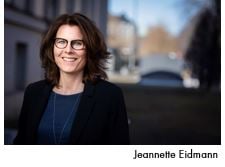 As a consultant in leadership development, Jeannette Eidmann has seen up close how stress, combined with failing strategies for its management, can have negative consequences for an entire organization – with poorer prioritizing, rash decisions and an inability to be present in exchanges with colleagues. Today, Jeannette is a PhD student at the Stockholm School of Economics in addition to leading the Sustainable Leadership program for SSE Executive Education
As a consultant in leadership development, Jeannette Eidmann has seen up close how stress, combined with failing strategies for its management, can have negative consequences for an entire organization – with poorer prioritizing, rash decisions and an inability to be present in exchanges with colleagues. Today, Jeannette is a PhD student at the Stockholm School of Economics in addition to leading the Sustainable Leadership program for SSE Executive Education
How did we get here? The battle for our attention and the stress it brings
The complexity of what we have to attend to has increased. Our connected society offers constant distractions and for many people, it blurs the boundaries between work and leisure. We are constantly bombarded by people wanting to sell us their truths and their products. According to Philip Runsten and Andreas Werr, both researchers at the Stockholm School of Economics, the number of targets in an organization has grown sixfold since the 1950s. And the complexity of the way we organize ourselves has increased 35-fold over the same timeframe.
Attention is closely linked to focus, and herein lies the root of the problem. In order to fully focus, we need to be able to control and maintain our attention, and if we can’t do that, it has major consequences for our productivity, innovation and creativity. We may also have problems listening actively, which can be devastating for our relationships with other people and our mental resilience. Lack of focus is thus a problem to be taken seriously at both the individual and organizational levels.
As a leader, you play a key role in creating a sustainable organization
The above trend affects everyone, but for those who also have to lead others, the effects can be more significant. One definition of a leader’s role is to get colleagues to focus on the right things at the right time. As a leader, you thus have responsibility for both your own focus and that of others. Here in Sweden we also have a Work Environment Authority Statute (AFS 2015:4) that requires leaders to conduct ongoing dialogs and create an organizational and social work environment that prevents stress.
As a leader, you are also an important role model for others in the organization. You can’t be stressed and unfocused, and ignore your own needs while expecting others to change their behavior. The change needs to start with you. A sustainable organization begins with sustainable leaders.
What happens when we become stressed?
The constant flow of input means that we are constantly ‘on’, with few opportunities for downtime and recovery. The internet is a fantastic source of information, but also of entertainment, communication and other things that can give us a regular hit of the reward hormone dopamine.
"We run around like dopamine junkies.”
Stress also affects our capacity to handle complexity and set priorities. The stress engages a kind of autopilot that means we tend to choose the easiest tasks first. At the same time, we shut ourselves off from activities that require creativity, complex reasoning and conscious choices.
The more stressed we are, the more we activate the brain’s limbic system, where emotions such as fear are located. And Jeannette believes that fearful staff and companies are in no position to tackle and adapt to the rapidly changing world around us.
Why focus on sustainable leaders rather than sustainable organizations?
Ultimately this is about the whole organization’s competitiveness – perhaps even its very survival.
”To successfully manage future changes and be competitive, organizations and leaders need to be firing on all cylinders – they need to be focused, innovative and creative.”
The whole organization, its individuals and its culture need to change to achieve a more productive, innovative and sustainable working situation, but leadership is the key to the type of fundamental change that is required.
To become a sustainable leader, you are going to need good strategies for handling focus and complexity moving forward. You’ll need to be able to make decisions on tough challenges concerning recruitment and talent management, shifts in the global and economic balance of power and technological advances that are driving disruptive changes to the way we do business and run companies. And you won’t be able to handle this complexity well on your own. You need to be able to draw on other people’s input, reflections and thoughts – the collective intelligence. You are much better placed to source background information and handle key decisions with the help of others than you will ever be as a lone leader, according to Jeannette.
The whole of society needs to be on board
Historically, we have measured our successes as a nation in GDP – but we haven’t put the same effort into measuring the costs of reaching the set target. We are becoming sicker and increasingly unhappy, but organizations can play a central role in nudging this trend in a more sustainable direction. And they have everything to gain from doing so..
"The best thing about the sustainability approach is that it’s a total win – there are no losers.”
3 tips for organizations that want to be more sustainable:
- Provide quiet/calm spaces that allow for more focus – this is particularly important in open-plan offices and other noisy environments.
- Encourage a healthy balance of body and mind, for example by ensuring that people have an opportunity to exercise both physically and mentally at work.
- Train your leaders in sustainable leadership and, ideally, train the rest of the organization in mindfulness.
Sustainable Leadership
Sustainable Leadership is a nine-day course that helps organizations to break the negative trend by making their leaders more sustainable. The leaders are given tools and strategies to better manage their own situation at work, while also gaining ways to push the rest of the organization in the right direction.
Do you want to know more about the program?
Please contact Patricio Trujillo, +46 73 384 14 17 patricio.trujillo@exedsse.se or download more information.

Jeannette Eidmann is currently director of the Sustainable Leadership program at SSE Executive Education, alongside her PhD studies at the Stockholm School of Economics. Jeannette has a degree in Economics plus an MSc in Gestalt in Organizations and has worked extensively with leadership development and executive development since 2006. Jeannette is certified in neuroleadership and is also an accredited mindfulness instructor.

